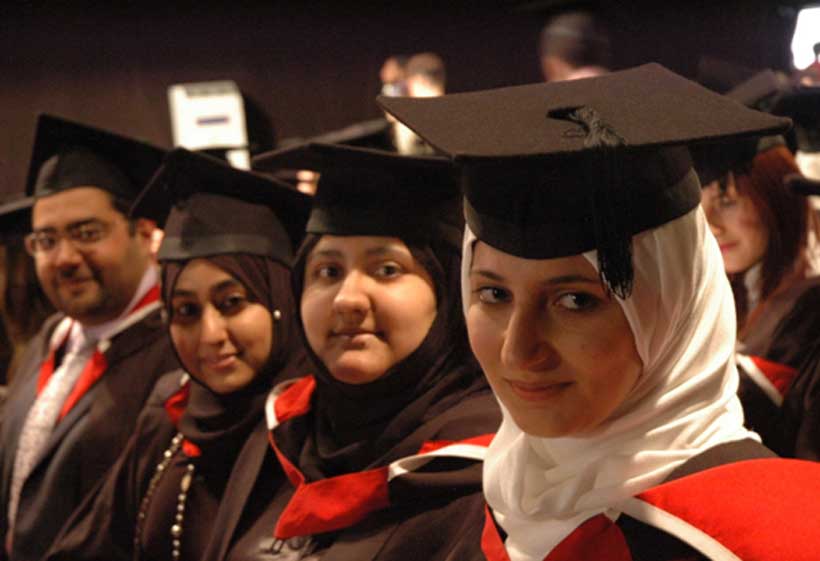Globalization and technology have unlocked a range of economic prospects for women, providing them new role models beyond their own communities. Muslim women, particularly those with education, are choosing to exercise their knowledge, understanding and empowerment outside their homes, stepping into a realm unforeseen by their mothers and grandmothers generation.
The Western political discourse is overwhelmed by the economic rise of China and India, the subject-matter of “Muslim Global Economy” and particularly the exponential role women have over the years played in making it a reality has been generally ignored. The “Muslim World” despite compassing diverse culture, geographies and culture remains to share the common flag of Islam. Despite the general difficulties arising as a result of internal and external state challenges, the Muslim states contribute to an overall of 12 percent of the global GDP and one-fifth of the aggregate population. The top-end of states in terms of per capita incomes including Saudi Arabia, United Arab Emirates, Qatar and Kuwait to a name a few, followed by upper middle income countries including Malaysia, Turkey, Iran, Jordan and Pakistan; and lower middle income economies such as Morocco, Bangladesh, Egypt and Tajikistan. Muslims are younger than the global population average, with a median age of 23 rather 28 writes Saadia Zahidi of World Economic Forum writes in Fifty Million Rising: The New Generation of Working Women Transforming the Muslim World that they “own the Muslim world’s ‘baby boom’.” It is also added the younger generations of Muslims are relatively more educated, holding a positive attitude towards the use of new technologies with an inclination towards democratic reforms in the state apparatus.
Traditionally, women were a minority in education, a trend, which has greatly changed over the years making them majority university students in the Muslim world. In Indonesia, women’s university enrolment has increased from 2 percent in the 1970s to more than 34 percent at present. In countries such as Kingdom of Saudi Arabia, about ten years ago only 30 percent women of university age women attended college or university. Today, the figure has risen to 50 percent, a rate that is higher in proportion to than that of India, Brazil, China and Mexico. Such trends have allowed for emergence of “new base of talent,” adding to the skilled workforce of the Muslim world. Zahidi writes that Muslim women have stemmed a “Fourth Industrial Revolution” by actively participating in disciplines of science, technology, engineering and mathematics. In countries such as Brunei and Kuwait, the figure surpasses even that of participation by men.
At the turn of the millennium, fifty million women joined the Muslim economic workforce which Zahidi calls as “underreported revolution happening for women, with the arrival of the largest and most education cohort ever to have entered their economies of labour markets at any one time”. There were 100 million working women at the start of millennium, a figure that has been exponentially risen to 165 million, an increase of more than 60 percent in less than 20 years. Working women therefore represent 40 percent of the 500 million women contributing in the Muslim economies. Labour force participation rates vary from 75 percent in Kazakhstan to 56 in Indonesia and Malaysia, followed 45 percent in UAE, 35 percent in Turkey and 30 percent in Pakistan, which are growing at a faster rate for women than for men.
Women in the “Muslim Global Economy” who are working have an aggregate income that amounts to over $1 trillion, which most certainly proves that investment in women’s education pays off considerably for the state’s economy. If equal participation in the workforce for Muslim countries is achieved, a hefty $6 trillion to their incomes may be added. In the Middle East alone, female labour force participation rising to its full potential by 2025, could increase the region’s GDP by 47%, according to McKinsey.
As the numbers of working Muslim women grow, the implications of their rise go well beyond the borders of the Muslim world. Furthermore, one in ten of female is a Muslim woman. In fact, there are already more working women across the Muslim world than there are in the US or the EU. Their economic fortunes will determine the prosperity and stability of their own countries, and, by consequence, of the global economy.While the rapid rise of working women across the Muslim world is new, today’s cohort of ambitious businesswomen can look to history for a role model. The first convert to Islam was a businesswoman, a wealthy merchant named HazratKhadija, who hired the Prophet Muhammad(SAW) and sent him on a trading mission from Mecca to Syria. She became his wife, and financed the supporter of the new religion in its early days.
Governments need to catch up to the new realities of the growing legion of female workers, employers, taxpayers and consumers, in particular by broadening access to finance, transport and technology. They therefore must encourage female education, entrepreneurship and training, and incentivize businesses to hire, retain and promote women.


